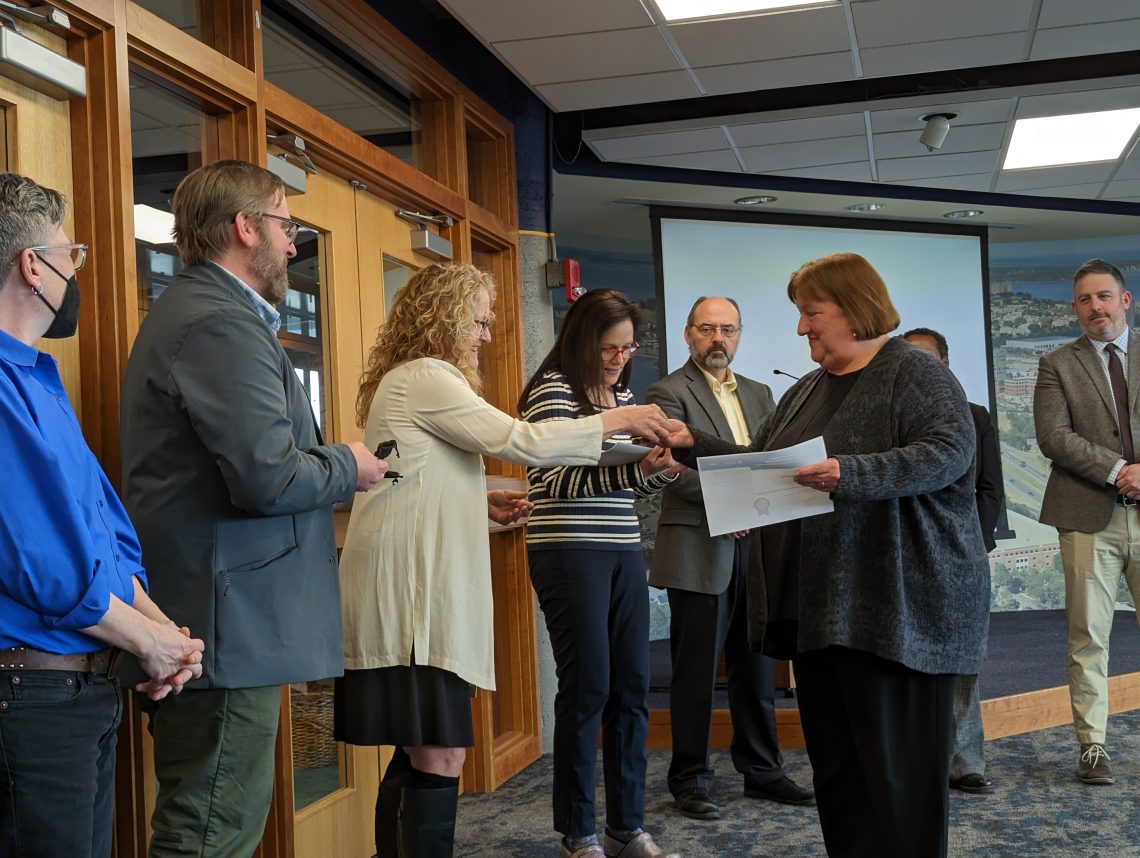Dr. Melinda Butler is an experienced educator, teaching both in person and online. But Butler, Assistant Professor of Literacy Education and Chair of the University of Southern Maine’s Department of Literacy, Language, and Culture, wanted to know more. Were there ways to better meet the needs of all the students in her classes? Could she hone her online teaching skills? What were the latest best practices in higher education?
So last year, Butler joined 23 other USM colleagues for the University’s first participation in the Effective Teaching Practice Framework course offered by the Association of College and University Educators (ACUE).

Over the next year, Butler and her colleagues spent 25 weeks learning through online modules, discussion boards, feedback and collaboration, and exposure to hundreds of evidence-based best practices. At the pinning ceremony celebrating their ACUE course completion this spring, each member of the USM cohort received a certificate.
They also left ACUE with something more: knowledge.
“There were so many good things,” Butler said. “I picked up a lot of (teaching) strategies.”
Strategies like giving students more choice in reading assignments to better engage and motivate them. Strategies for responding to difficult student discussions — whether that response needs to be immediate or privately done later on. Strategies to make classes accessible, regardless of how students attend.
“Even though these are online strategies for either synchronous or asynchronous situations. . . I’ve been able to apply these to my in-person classes,” Butler said.
That’s exactly what USM had hoped for when it partnered with ACUE.
“What we’ve seen is that the lines between online and classroom-based instruction are getting blurrier every day, so the skills they learn in ACUE will translate to all aspects of their teaching,” said Paul Cochrane, Executive Director of Digital Learning Strategy and Programs.
ACUE’s research-based best practices and resources focus largely on making learning accessible to all students. The teaching practices that faculty learn through ACUE help students become better learners, and faculty can gain increased confidence knowing they have the tools to help their students succeed. For instructors, that might mean being more deliberate when setting up learning groups and facilitating group discussions, or it might mean being more open with assignments, or it might mean being more clear with class expectations.
“One of their focuses has been on helping to level the playing field for students who might traditionally struggle in college — for example, first generation students, Pell (Grant) eligible students, students who may not have received the kind of grounding in high school they really needed to be successful or who may not speak the language of the university coming in,” Cochrane said of ACUE. “They’ve taken all of those effective practices and bundled them in this program.”
Last spring, 75 USM faculty members applied for 31 slots in the University’s first ACUE cohort. Ultimately, 24 instructors from across disciplines went through the program.
While this was the University’s first time with ACUE, it won’t be the last. The course was so successful that USM formed a second cohort — they started work in April — and the University is already looking forward to cohort number three.
Butler enjoyed ACUE so much — and feels like she learned so much — that she shared ACUE’s resources with other faculty who couldn’t attend. And she’s a facilitator for USM’s new ACUE group that started in April.
“It’s a great review for me in case there’s something I forgot because there are just so many wonderful strategies shared. So many resources,” she said.

